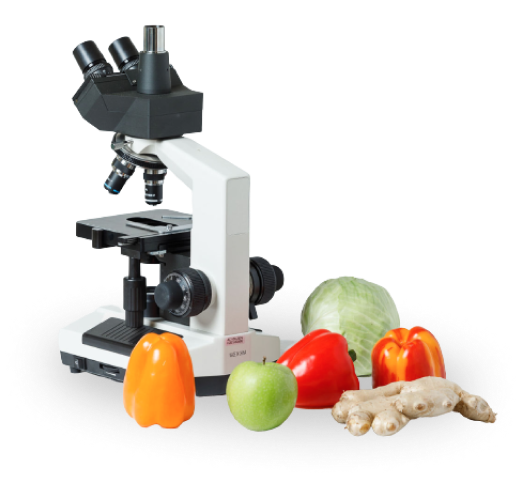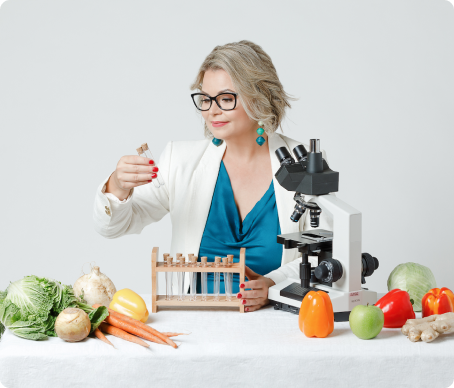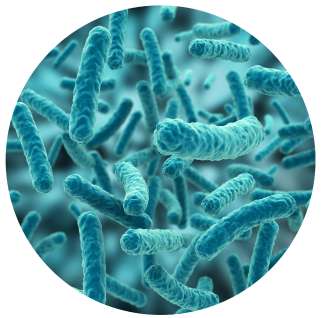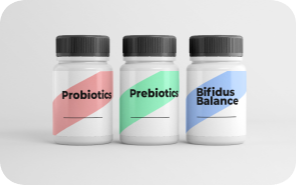Microbiome Testing
Disclaimer: I only recommend products and services I genuinely love and believe are healthy based on all my science knowledge.
I may receive commissions from purchases made through special links in this post. Learn more

We are mostly bacteria and not humans
Sounds weird, but true! Human microbiota is a complex community of all microorganisms IN and ON our bodies, that are literally sharing our body space with us. Some of these bacteria are commensalCommensal bacteria - are bacteria that 'eat from the same dish', but they neither harm each other nor benefit. It's a neutral relationship. (not harmful) bacteria that are just there. Others are known symbiontsSymbionts - are organisms that coexist together and their life depends on each other. Gut microbiota performs many functions that we cannot do on our own and as a result benefit us. (beneficial) that we know are doing something good for our body and we are helping them (or at least should be helping by providing food) to exist and coexist with us. And some are opportunisticOpportunistic pathogens - are microorganisms (bacteria, fungi, parasites or viruses) that can cause an infection by taking advantage of an opportunity not normally available. This opportunity usually occurs when the immune system is weak. (can be harmful when opportunity allows) pathogens, than can be activated if our immune system is not functioning well. However, if immune defense is in order then their population is under control and these pathogens are not usually dangerous.
Gut microbiota (also known as gut flora or microflora) is the population of microbes residing in our intestine. According to the latest research there may be at least 1000 different bacterial species present in our intestine. Scientists from Weisman Institute of Science in Israel published that a “reference man” has about 30 trillion human cells and 37 trillions of bacterial cells. This means that 56% of our body is made of bacterial cells most of which reside in our intestines. You can read the original article here. Isn’t that fascinating?
Another interesting fact discovered by scientists from Harvard Medical School is that our microbiota is pretty unique, only 50% of all species are shared between different individuals. The rest of the microbial composition is individual and can potentially be our “identity print”.
Microbiome is a combination of all microbial genes. The Harvard study I mentioned earlier identified about 23 million different genes in the gut microbiome, whereas the human genome has only 23 000 genes. And again microbes’ genes outnumber our own. According to these statistics, genetically we are less than 1% humans but mostly (99.9%) microbes.

You might be wondering now what they are there for?
What do they do in our gut?
All these microbes play their own roles in our health and disease. These are just some of their functions:
They help us digest food, especially if it is rich in fiber
Gut bacteria present in our intestines are naturally designed to fight infections and protect our bodies via producing antimicrobial substances
They regulate the function of our immune system
Some of them produce vitamins and minerals and help absorb nutrients from foods
They regulate the function of nervous system and as a result may effect: mental health or social behavior
They may help to maintain healthy weight
They may help with allergies and food sensitivities
They maintain our cardiovascular health in balance
They are protecting us from toxins and other chemicals that get into our bodies with food
They can regulate aging process
Balanced microbiome may have anti-cancer properties
They can be responsible for our skin health


Connection between microbiome and immunity
Most people, including many physicians, do not realize that at least 80 % of your immune system is located in your gut, making a healthy digestive system a major focal point if you want to maintain optimal health. When all your good intestinal bacteria are in balance your body is in balance too. Once something shifts the balance of your intestinal bacteria a number of health issues can occur. Such disorders as allergies, atopic dermatitis, asthma, Candida infection, type 1 diabetes, irritable bowel disease, celiac disease, rheumatoid arthritis, gastroenteritis, obesity and colorectal cancer have all been linked to dysfunctional gut microbiota.
Should I test my microbiome?
It’s a good question! Many skeptics even from this field will tell you it’s too early and the science of microbiome is in its infancy. As a matter of fact, I started researching the area before 2000. So just me alone have about 20 years of research in this area. Science never stops. That’s the beauty of it. We will be constantly discovering, learning and changing our approaches.
It’s true that we do not have all the answers yet. However, the plethora of data that we have today suggests that certain microbiome parameters are extremely important for our health:
Microbiome diversity
Presence/absence of beneficial bacteria (like Bifidobacteria, Lactobacilli and others)
Presence/Absence of potentially harmful bacteria (like Escherichia coli, Salmonella sp., Candida sp. and others)
Microbial signatures indicating disbalance


It’s an established consensus in the scientific community that microbial diversity is directly correlated to health. The better diversity the better health. We also know that microbial diversity is declining from generation to generation and we are losing some bacterial species. It’s been demonstrated by numerous studies published in high impact peer-reviewed journals.
The bottom line is we are very individual from the human genome perspective but also from the gut microbiome prospective. Unless you test your microbiome you can’t really know the diversity status and it’s hard to find the ideal probiotic formulation.
How can I test my microbiome?
If you are seriously interested in learning more about your microbiota and considering making changes to the way you live, I recommend to test your microbiome by choosing VIOME TEST.
Viome is the only company that detects active:


The results of this test show which exactly microbes are present and what they are actually doing in your gut. Not potentially doing! But really doing at the moment of collecting the sample. This is the biggest difference between this test and many other available tests. I will explain the method in more details below.
Viome is not using 16S rRNA gene sequencing like most other companies on the market today, but instead they are sequencing the actual isolated from your stool RNA molecules. This means they are looking at the microbial transcriptome – basically all the genes that are currently expressed (active) in your microbiome.
This technique allows you to find out not only who lives in your gut but also what all these living creatures are doing there. Right now there is no other company that provides even similar service. Based on the functions of your microbiome Viome identifies which foods are your superfoods and which foods you should avoid.
16S Sequencing
Identifies only a fraction of your gut bacteria; unable to identify nonbacterial microorganisms
Sequences DNA, which can come from food and dead microorganisms
Low resolution (mostly genus and lower resolution)
Unreliable; sequencing the same sample twice can yield very different results
Does not measure microbial gene functions
Does not assess what the microbes are doing
Low resolution and lack of gene expression data preclude actionable recommendations
Metagenomic Analysis
Cannot identify any RNA viruses or RNA bacteriophages
Sequences DNA, which can come from food and dead microorganisms
Low resolution (mostly genus and lower resolution)
High resolution (species and strain level), but does not include RNA viruses
Minimal variation in results, but partially biased analysis (no RNA viruses)
Does not measure microbial gene functions
Does not assess what the microbes are doing
Lack of gene expression data preclude actionable recommendations
Viome Metatranscriptome Sequencing
Sequences RNA, which comes from live microorganisms that have a great impact on our health
High resolution (species and strain level) of all microorganisms
Minimal variation in results and unbiased analysis
Quantifies expression levels of active microbial gene functions
Allows assessment of pathway activities that can lead to personalized health insights and recommendations with molecular-level precision based on what the microbes are doing
How can I order the test?
Please use this affiliated link to order Viome test and receive 10$ OFF
your test (!not always combined with other promotions).
Tip: If you are planning to order several tests, then I suggest to order each
individually using my affiliated link, that way you can receive $10 OFF on each test.
If you need help interpreting the results please go here to book consultation.
To receive all the benefits of working with me, highly qualified PhD scientist, one-on-one, you can check all the options for private consultations.
Let’s get on the path of a balanced microbiota and feeling your best!
YOU ALSO MAYBE INTERESTED IN

microbiome blog articles

microbiome friendly recipes

product that i recommend to support your microbiome

